THE TRAINING CURRICULUM
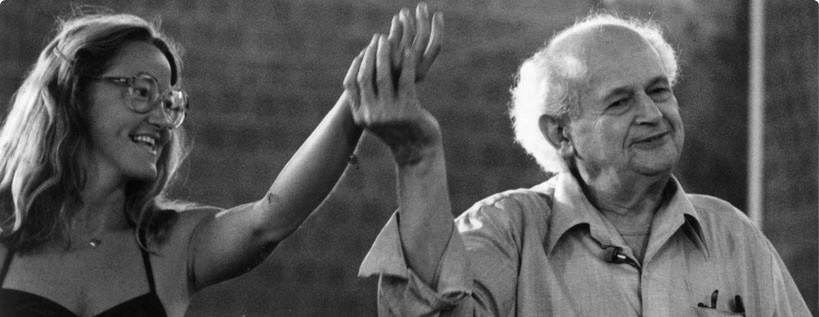
EDUCATIONAL OBJECTIVES
We hope to impart the spirit of Dr. Feldenkrais’ curiosity and creativity, a deep interest in how we learn and function, the implications of this in our daily life and in our understanding of the broader issues in our lives and in the lives of others. We hope that all participants in the training (including trainers, assistant trainers, administrators and trainees) will benefit from these learnings.
The graduates of this program will be competent in all aspects of the Feldenkrais Method®. This includes the preparation of trainees for competence in the practice of both Awareness Through Movement® and Functional Integration®. In unique personal ways each trainee should be able to reliably, effectively and enjoyably practice the Feldenkrais Method®
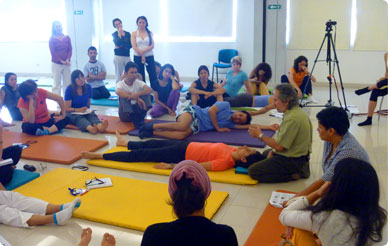
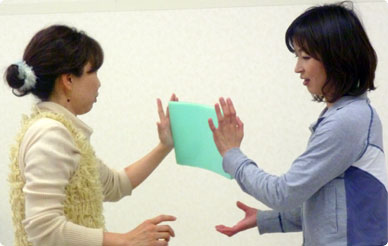
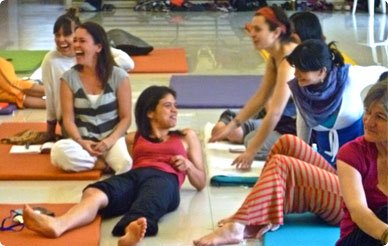
Skills You Will Develop
During the training you will develop:
• A finer understanding of human function and how movement effects your self-image (thinking feeling and sensing).
• Increased curiosity, creativity, clarity and vitality
• Greater self-awareness and clearer self-expression
• Improved self-esteem, and greater flexibility and a fuller sense of well being.
Upon completion of the training, you will be able to:
• Effectively present Awareness Through Movement® lessons
• Articulate the basic ideas of the method
• Understand the functional similarity of Awareness Through Movement® and Functional Integration®.
• Give appropriate and effective Functional Integration® lessons.
• Be able to think and sense functionally, within the context of the skeleton, the nervous system, the muscular system and the environment.
• Address chronic tension & pain, athletic & artistic perfor mance problems, deteriorating function and neurological difficulties.
• Help infants to elders realize innate abilities, learn new skills and recover old ones.
You will have more choices in everything you do. The way you move, the way you communicate, the way you interact with the world.
Participate in this training and reap benefits and rewards beyond your imagination.
Year One
In the first year, we present the basic tenets of the method. To develop your appreciation of the work from the inside out, you are immersed in Awareness Through Movement® (ATM). Fundamental ideas - from learning theory, physics, kinesiology, anatomy, and neurophysiology - will be introduced through experiential learning. We begin by working on listening - with eyes, ears, and hands - to develop your ability to observe movement and understand the mover. Observing yourself and the other trainees, you will begin to recognize how individuals organize similar movements differently. Interactive exercises will bring you a new appreciation of the experience and expression of the physical self.
Functional Integration® (FI) training will introduce the art of making contact and the various ways of touching. Exercises will emphasize developing tactile sensitivity, working with awareness through touch, learning basic skeletal anatomy through experiential exercises, and understanding the principles of movement.
Year Two
In the second year, you develop an understanding of the grammar and syntax of ATM lessons. We review and elaborate on the themes from Year One. Personal experience and discussion will guide you in reflecting upon what constitutes the underlying structure of a lesson. We look in depth at a number of classic ATM lessons. You learn how to give instructions and guide a class, as well as how to relate the lessons to activity in daily life. You will teach lessons to each other while being supervised by teaching staff. At the end of the second year you will be authorized to teach ATM to the public on a provisional basis.
The teaching of FI will also be included. You will begin to explore the relationship between ATM and FI, learning to teach the same "classic" themes either verbally or by touch. In order to avoid “recipes” and foster real understanding, the same theme is developed from a number of different angles and with varying constraints. Much of the hands-on work is introduced through guided work in pairs and small groups. You complete the second year understanding fundamental lesson configurations through verbal and hands-on approaches.
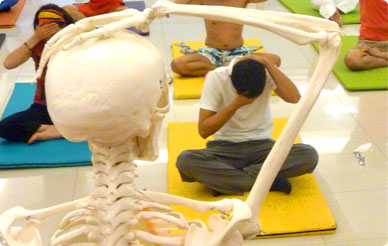
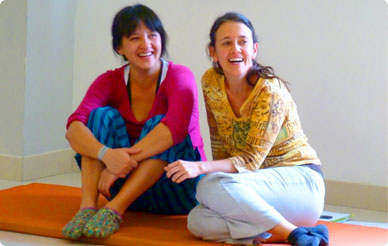
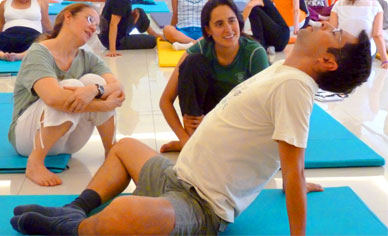
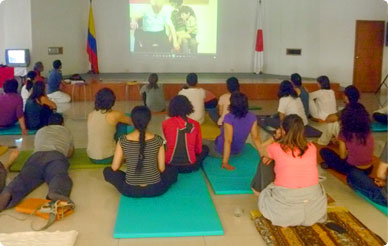
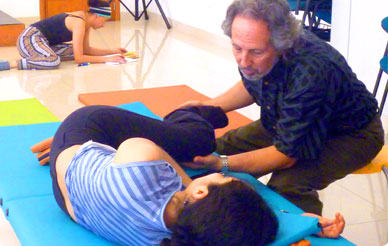
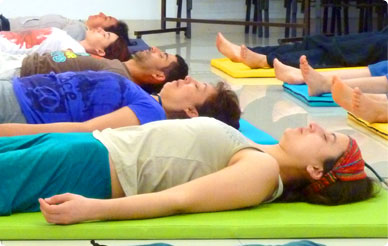
Year Three
In the third year, you clarify concepts and refine the hands-on skills needed to achieve competency in FI. These skills develop through active learning and problem solving. Self-guided exercises in small groups require you to grapple with questions and solve problems creatively. Both hands-on and group teaching skills will be developed throughout the program. Inquiry into the teaching of ATM continues into the third and fourth year. As you begin to teach ATM outside the program, we will present more complex ATM lessons, and provide forums for questions, discussions, and exercises. Through a supervised internship or project in your own community, you begin to apply what you have learned. You will be giving Functional Integration® lessons to other trainees and working with a client from outside the program. In a private tutorial we work closely with you to identify your areas of need and to develop specific, personalized solutions. This approach is designed to create a safe environment for exploration and learning.
Year Four
In the fourth year, you will continue to refine and broaden your skills in all aspects of the work. We will introduce more unusual and challenging positions and situations both in the group lessons and in the hands on work. We will continue to explore what constitutes a lesson and to develop your understanding of how it works. You will observe the teachers giving two to three lessons with the same outside person. The ideas behind a series of lessons will be developed. Special attention will be given to the beginning and ending of lessons and interviewing will be presented as a special skill. We will be paying special attention to your ability to articulate and present the work at this stage. To provide as much individualized feedback and attention as possible, we use small groups with increasing frequency and longer duration in the final year. You will work in small groups under the leadership and supervision of a trainer or assistant trainer. During year four you will be supervised giving lessons to the general public.
LEARNING STRATEGIES
Awareness Through Movement®
You will experience many hours of Awareness Through Movement® (ATM) lessons throughout your training. The core of the lessons will be drawn from the trainings that Moshe Feldenkrais conducted and from the classes he taught. You will experience many different types of lessons, including intricate lessons that have an extended and interwoven structure as well as those usually taught to the general public. While they may initially appear different, Awareness Through Movement® and Functional Integration® (FI) are closer than you might imagine, simply two sides of the same coin. We will begin developing basic FI skills through touch right from the start and also will continue to emphasize ATM teaching skills throughout the entire program.
Functional Integration®
As part of your training experience, you will receive at four individual Functional Integration® (FI) lessons each year from members of the staff and from invited practitioners. Experienced practitioners will usually be present to offer supplementary lessons. Beyond that, you will be given opportunities to observe lessons given during class, lessons given to other students during non-class hours, and video tapes of Moshe Feldenkrais giving lessons.
We begin teaching hands on skills and touching early in the program, emphasizing the development of basic sensing abilities such as "seeing and listening with your hands." You will refine your tactile and kinaesthetic acuity in ATM lessons and in small group work. Starting in year three and continuing into year four you will have the chance to work with the public under supervision. Also in the third and fourth years you will also have the chance to practice FI with your teachers in one-on-one tutorials where you will receive individual feedback.
Class Discussions
We will hold regular discussions, both in small groups and with the entire class. These discussions will vary in style from questions and answers, dialogues, open-ended talks, and specific conversations. You will be asked to grapple with difficult questions and to investigate them. To encourage autonomy and competence, there will be opportunities for student-led discussions.
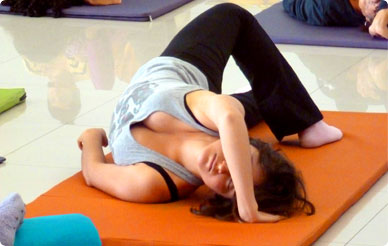
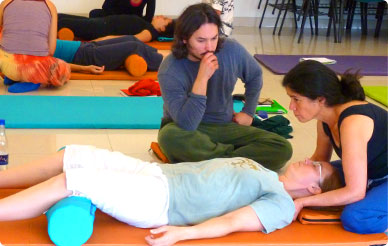
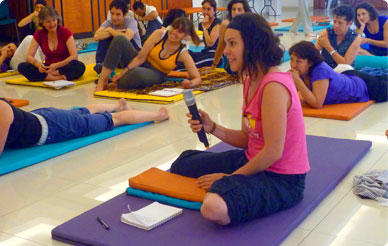
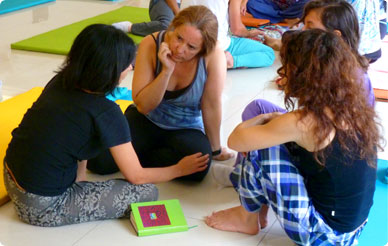
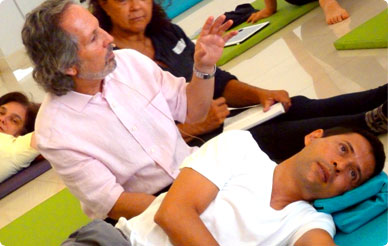
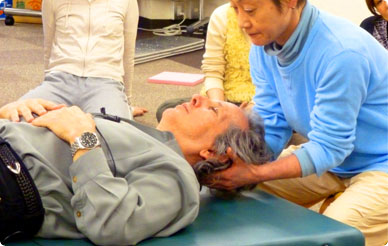
Small group experiences
Small groups will facilitate the process of learning. Group exercises will include discussions and assigned activities, such as observing a movement or working with each other in specific ways. Small groups will also be used to develop your ability to understand and teach ATM and FI. For example, you will review ATM lessons in class, analysing and discussing the structure and logic of the lessons. As the training progresses, you will have the opportunity to present short sections of the lessons and develop your presentation skills. We are committed to creating a constructive atmosphere for small groups. The purpose of this setting is to create a place where you and the other students can speak and be heard. In these small groups, you will discuss the training process by reflecting on class events, identifying difficulties, and developing solutions. By drawing on the different skills and backgrounds that the trainees bring, the group will be a place for collaborative interaction and cooperative learning. We want to expand beyond the idea of individual learning in a group to create a process of learning with a group.
Lectures
Trainers, assistant trainers, and guest lecturers will present short talks on the background of the method, on related areas of current knowledge, and on developing and running a practice. You will learn about Moshe Feldenkrais and the historical, philosophical, and scientific basis of his education and experience led to the method. So that you understand how the Feldenkrais Method® differs from prevailing ideas about movement and instruction, you will be introduced to relevant topics in the movement arts and sciences, contemporary education, and philosophy.
Supervision
The educational director, along with the other trainers, will get to know you, work with you individually, and track your progress. By observing how you learn, interact, and practice, we will be able to assess your progress and development. That means that supervision - in the sense of watching and guiding - will be an on going aspect of the program. To facilitate this process, Alan will be available to meet with trainees who want to discuss their learning process. Any subject areas or skills that need work will be identified and addressed to promote our learning. A personal strategy for supplemental study will be mapped, and assignments for focused learning between segments formulated.
Between segment guidelines
The training is designed to facilitate your continuous, incremental learning. This includes making sure that the intervals between training segments are well utilized. To that end, we encourage you to take ATM classes or workshops offered by your local practitioners during the interim periods. In this way, you can learn about styles of teaching and begin to interact with future colleagues. For the same reasons, we also suggest that you receive at least a few series of FI lessons between segments.
To deepen your understanding of the method and to strengthen your ability to express that understanding, we will ask you to read specific texts and give you writing tasks between segments. For example, during the second year, we will ask you to write an outline for a talk to the public; these outlines will then be used in small groups for discussion and suggestions.
To support your on going learning, we have the intention to record the training program. And make it available to you either for free or for the cost of duplication (DVDs only-MP3 recordings will be given to you for free). To help keep in touch with each other and with the learning process, we will ask you to participate in regular study group meetings with other trainees from the program. We will assign different tasks and exercises for you to do in your study. During the second half of the third year and the first half of the fourth year, you will do an internship or community-based project. You will be asked to apply what you've learned about teaching ATM for the benefit of a specific group in the community with the guidance of a local practitioner.
Evaluation Process
Our emphasis is on personalized training, in which you will have on going contact with the teaching staff.
Supervision and feedback are inherent in the training process. Your progress and learning will be closely followed, supported, and guided throughout the four years.
Our personalized approach, and emphasis on small group learning, enables us to monitor your progress through the training in a collaborative and supportive fashion. Thus, we can identify your areas of need, develop a plan of action, and follow up over the course of the program.
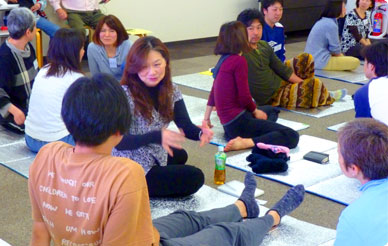
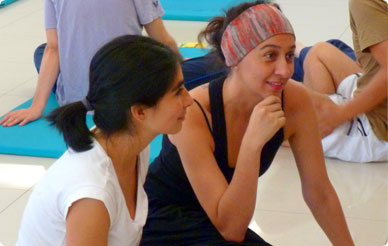
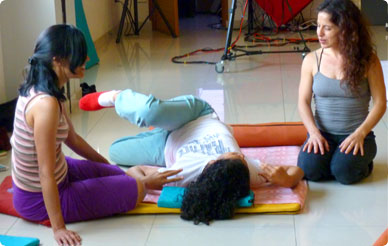
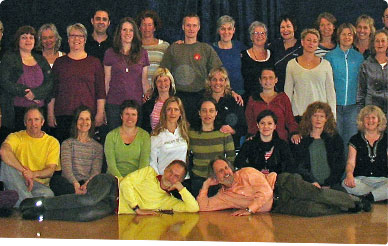
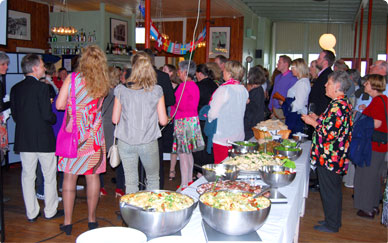
In the same way you will have the chance in each segment to evaluate your experience of the training, teachers and staff as well as your own impression of your learning and development.
We expect trainees to exhibit professional behaviour throughout the training. However, should this not occur, we will address the matter immediately and seek a positive solution.
Graduation
Graduation from The Feldenkrais® Professional Training in Santa Fe means you are qualified to practice as a Feldenkrais practitioner.
As a graduate you will be eligible to apply for membership in The Feldenkrais Guild® of North America (FGNA). This will give you the rights to use the service marks the FGNA now own that protect the Feldenkrais Method® in the community. Certification is entirely the responsibility of the graduate.
You will receive a certificate of Graduation that is recognized by all Guilds who are members of the International Feldenkrais Federation.
Graduation is complete only after all monies have been paid in full.
To graduate from The Feldenkrais® Professional Training in Santa Fe you will be required to: Demonstrate, in-class, the ability to teach Awareness Through Movement and give Functional Integration lessons to a professional standard; and attend fully throughout all the segments.
Any student missing more than 5 (five) training days per year or more than a total of 10 (ten) days over the course of the entire four years will be required to make up lost time before being eligible for graduation. Tuition will not be reimbursed for missed days. Should you miss more than the maximum allowed number of class days, special arrangements must be made with the Educational Director to make up class time in another training program. This may incur additional costs,
The Educational Director reserves the right to ask any student to receive further training before being considered for graduation.



